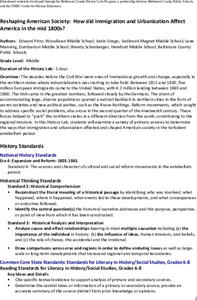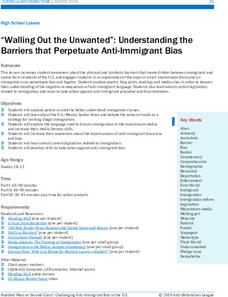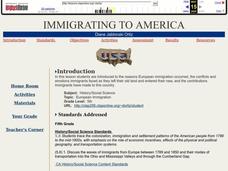Constitutional Rights Foundation
Arizona v. United States — States and Immigration Law
As part of a study of immigration law, class members read a summary of the Supreme Court case, Arizona v. United States. They then examine a series of examples and acting as federal court judges, must determine if the scenarios meet the...
Museum of Tolerance
Immigration Journeys
Through the journey of four stories of immigration, scholars complete graphic organizers and apply knowledge to create a visual representation of their findings on a large poster. Third and fourth readers write a letter to their family...
University of Minnesota
Making an Immigrant Story
Budding historians research the trip immigrants to the United States take and the reasons behind their willingness to start over in a new place. Groups create their own video lessons outlining the story of human migration from departure...
Constitutional Rights Foundation
Educating About Immigration The DREAM Act
Group members role play state legislators, supporters of and opponents to the The DREAM Act (Development, Relief, and Education for Alien Minors). After listening to the arguments put forth for and against the immigration legislation,...
Curated OER
Images of Immigration
Students evaluate how images of immigrants reflected political and social attitudes toward them in the United States. They interpret visual images in the context of historical and political developments.
Curated OER
Immigration
Students explore the effects of immigration on the immigrants and on society as a whole. They survey opportunities to understand the complex issues of the immigrant experience, both past and present. Illustrations of immigration...
Curated OER
Immigrants in America
Possibly helpful in the context of a larger unit, this presentation about 19th-20th century immigration leaves much to be desired. Some useful information about limitations of immigration and the rate of growth could be incorporated into...
Constitutional Rights Foundation
Plyler v. Doe: Can States Deny Public Benefits to Illegal Immigrants?
Illegal immigration is an ever-changing source of consistent controversy. A reading passage about the rights of undocumented workers and illegal immigrants—and the lack thereof—guides high schoolers into a mock trial activity. Three...
Center for History Education
Reshaping American Society: How did Immigration and Urbanization Affect America in the mid 1800s?
From the Know-Nothings to the Bible Riots, immigration and urbanization changed the face of America in the middle of the 1800s. Using documents that range from immigrant experiences to renderings of violent conflict between immigrants...
Teaching Tolerance
Using Photographs to Teach Social Justice | Exposing Anti-Immigration Sentiment
The debate about immigration reform continues. To gain a deeper understanding of the issues involved, class members first examine a photo of an anti-immigration rally. Groups then conduct an internet search for an image that presents an...
Angel Island Immigration Station Foundation
Interrogation of Immigrant
Imagine being interrogated by someone you don't know about minute details of your life. Imagine that the interrogator is matching your responses to the answers of other family members. Imagine how you would feel knowing that the...
Angel Island Immigration Station Foundation
Exploring Oral Histories of Angel Island Immigrants
Empowered by the previous lesson where they interviewed a family or community member, young historians examine Angel Island immigrants' oral histories. They use a matrix to record their interpretation of the feelings of the immigrant....
Anti-Defamation League
"What is it Like to be an Outsider?”: Building Empathy for the Experiences of Immigrants
This lesson highlights the struggles of immigrants and the importance of showing empathy. Beginning with a read-aloud of a book in another language and a poem, scholars take part in a thoughtful discussion. Then, the class examines a...
US Department of Commerce
Immigration Nation
People come and people go. Given tabular census data on the annual number of immigrants from four different regions of the world between 2000 and 2010, pupils create double bar graphs and line graphs from the data. They analyze their...
Anti-Defamation League
“Walling Out the Unwanted”: Understanding the Barriers that Perpetuate Anti-Immigrant Bias
As part of a study of immigrant bias, high schoolers investigate the language used in blogs, readings, media reports, and current legislation whose language perpetuates xenophobia. They then consider ways they can get involved in...
PBS
The Lowdown — What You Need to Know about Immigration Reform
We're all from somewhere. An informative interactive provides information on immigration, foreign-born residents, and deportations. Pupils interpret the graphics to analyze how these quantities have changed over time. The resource is...
Curated OER
Immigrating to America
Coming to America as an immigrant can be an emotional and difficult process. This instructional activity has learners explore what it means to be an immigrant, listen to real life accounts, and visit an online museum. This is a wonderful...
Curated OER
Immigration Connections: The Squamish Nation and Bainbridge Island Filipino Americans
High schoolers explore ancestry and immigration. In this Canadian immigration lesson plan, students interview their family members to identify their cultural history. They compose an essay that compares Filipino immigration stories to...
Curated OER
Educating European Immigrant Children Before World War I
Discover the challenges in educating immigrant children at the turn of the 20th century. Reforms that New York City schools used are described here and data is included for your class to analyze, in its evaluation of the effectiveness of...
Curated OER
Coming to America: U.S. Immigration
Analyze primary source documents relating the conditions under with prompted American immigration. Learners will analyze information in order to create a six-panel pamphlet. Much of the lesson is not available but the key objectives are....
Curated OER
Immigration and Ellis Island
Fourth graders explore family histories. In this social studies instructional activity, 4th graders identify the countries from which their ancestors came and locate them on a map. Students discuss the role that Ellis Island played in...
Curated OER
US Immigration
Middle schoolers examine the history of immigration in the United States. Using primary source documents, they identify the areas of origin for people settling in Minnesota and describe the push and pull factors that brought them there....
Curated OER
Immigration Push and Pull Factors
Eighth graders explore the definitions for push and pull factors and determine whether reasons for immigration are considered push or pull factors. They then determine their own reasons for immigration and categorize them.
Curated OER
Middle-Class Women Provide Maternity Health Services for Immigrant Women
Students examine how different groups gave health services to pregnant immigrant women. They analyze the class and ethnic tensions during this time period. They work together in groups to read articles and answer questions.
Other popular searches
- American Immigration
- United States Immigration
- 1800 1900 Immigration
- U.s. History Immigration
- Immigration and Urbanization
- 19th Century Immigration
- Illegal Immigration
- Chinese Immigration
- Bureau of Immigration
- Immigration in America
- American Immigration 1800's
- Caribbean Immigration

























